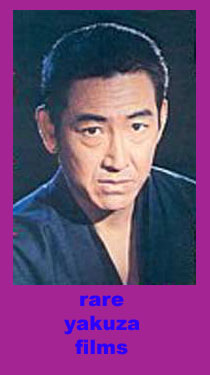 I saw Showa Saidai no Kaoyaku (Toei, 1966) at the greatly lamented Kokusai Theater in Seattle many years ago, with the print title given in English as Deep Shadow. I took a very few notes at the time immediately after seeing it, but too few to make the story come back to me sharply these years later. I saw Showa Saidai no Kaoyaku (Toei, 1966) at the greatly lamented Kokusai Theater in Seattle many years ago, with the print title given in English as Deep Shadow. I took a very few notes at the time immediately after seeing it, but too few to make the story come back to me sharply these years later.
The director credited on the 35 mm print was Kiyoshi Saeki, director of the first Karate Killer Priest starring Tomisaburo Wakayama, & director of many yakuza films including episodes of the superb Showa Zankyoden series.
But the film is elsewhere included on filmographies of Kenji Fukasaku, a cult favorite among yakuza film fans. I can only guess they both had a hand in direction, but would welcome specifics from any fellow Japan film fan who has the definitive information.
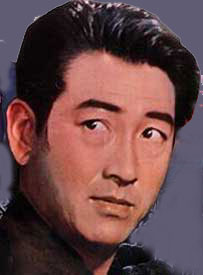 In the pivotal role of the chivalrous yakuza gambler we get Koji Tsuruta, who is pictured here in one of my stock photos since I could not obtain a still or poster for the movie. In the pivotal role of the chivalrous yakuza gambler we get Koji Tsuruta, who is pictured here in one of my stock photos since I could not obtain a still or poster for the movie.
Koji was one of the two greatest of the great gangster players (the other being Ken Takakura; & when they co-starred it was double the angst-ridden sad-eyed action). It co-stars the great Tetsuo Tamba & features Naoko Kubo, Tatsuo Umemiya, & the justly forgotten singer & television personality of the 1960s, I. George.
According to my old viewing notes, this one was standard fare, an okay yakuza-eiga opening in 1952 & documenting gang activities into the early 1960s, having too little fight action along the way, but a pay-off of carnage in the last reel.
Another yakuza-eiga in my old viewing-diary is given multiple stars by the title, so I clearly enjoyed that one a lot, but it's now gone from my memory. I took only a few notes at the time, & since (as I write this) it is mentioned nowhere on the web except as a title without reviews, I'll share at least what's in my notes for what they're worth:
The film is Daigashi (Toei, 1968). The English title on the 35 mm film print was Three Chivalrous Men though the Japanese title actually alludes to an oyabun/godfather's lieutenant, underboss, or manager of an illegal gambling hall. The tale is set immediately after the war in Manchuria.
My notes call it "A top-notch yakuza adventure, with a particularly nice gangster folksong (written by Hiroki Ogawa) for the doomful March at the end." It stars Ryutaro Tatsumi. There are fine support performances by such as Tomisaburo Wakayama, Shingo Yamashiro, Minoru Oki & Tatsuo Umemiya. I wish I had kept longer notes about it, as I just can't bring it back to mind to say more about it these years later.
I had more complete notes for the following equally rare yakuza-eiga seen around the same time; indeed, the notes were a complete rough-draft for a review. Although all three of these films had 35 mm subtitled prints in circulation for at least twenty years, they are seemingly not presently in circulation, & I could not find them as subtitled dvds.
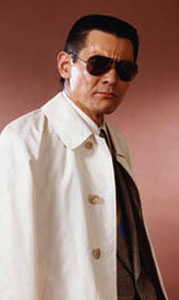 Bunta Sugawara gets the lead role as Tatsu in Choeki San-kyodai (Three Sworn Brothers, Toei, 1969). Bunta's shown here at the right in a stock photo, plus there's an old VHS box illustration immediatey below, & the original poster for this film at the top of the page. Bunta was to become a key star in the transformation of ninkyo or chivalry gangsters of the 1960s into the "new" psycho gangsters of the 1970s. The bery beginnngs of this transformation can be dtected in Three Sworn Brothers but in the main Bunta is for this outing in ninkyo mode.
Bunta Sugawara gets the lead role as Tatsu in Choeki San-kyodai (Three Sworn Brothers, Toei, 1969). Bunta's shown here at the right in a stock photo, plus there's an old VHS box illustration immediatey below, & the original poster for this film at the top of the page. Bunta was to become a key star in the transformation of ninkyo or chivalry gangsters of the 1960s into the "new" psycho gangsters of the 1970s. The bery beginnngs of this transformation can be dtected in Three Sworn Brothers but in the main Bunta is for this outing in ninkyo mode.
The supporting cast is fleshed out with some of the greatest yakuza-eiga stars of the era, & the primary leads are tremendous, including Tomisaburo Wakayama as Tatsu's sworn brother Owaku.
While imprisoned, Tatsu encounters "Ears" Danshi (Kyosuke Machida), a man with a ridiculous tattoo, but a big honsho in the prison pecking order. He meets his match in Tatsu, & after initial conflict they become sworn brothers too.
Tatsu & the sworn brothers he acquires weren't really gangsters before their prison time, just general ruffians who're in their own tough way good guys. Prison, however, introduces them to plenty of gangland characters & three years later, they're out of prison & enmeshed in the yakuza world.
Yujiro Jinno (Ken Takakura looking sad & beautiful in his role) plays the "loner with boy" trying to raise a son. His wife is a pot of ashes needing a burial place, carried by the boy, who falls ill from their hardships. The subplot about Yujiro & his son provides some truly sad, original moments in a film that would otherwise consist of standard yakuza fare.
A kindly oyabun (godfather) of the Matsu gang says to Yujiro regarding his son, "He can't be happy while you're a gambler. You'd better go straight. The gamblers world has changed since Japan lost the war."
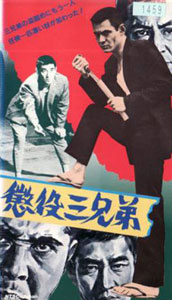 Though playfully macho for the first half, as tensions build between two gangs, the tone becomes increasingly tough. The Toyo gang are pretty much all bad guys & represent what the post-war & Occupation era yakuza have become. The Matsu gang attracts "good" tradition-minded yakuza who live by an ethical code that is vanishing from the gangster world. Though playfully macho for the first half, as tensions build between two gangs, the tone becomes increasingly tough. The Toyo gang are pretty much all bad guys & represent what the post-war & Occupation era yakuza have become. The Matsu gang attracts "good" tradition-minded yakuza who live by an ethical code that is vanishing from the gangster world.
However, as the evil Toyo group is run by Chinese boss. There are some unfortunately racist underpinnings to the plot. There's also a lot of misogyny in the story, as when "good" Danshi finds out his sister became a prostitute & disowns her, though he personally womanizes endlessly. But hey, even "good" gangsters are gangsters.
By & large it's a fairly ordinary story & only Ken Takakura's performance is great. For action, the story is punctuated with beatings & fistfights without finesse. Violence mounts up until the splendidly tattooed Masa (Ryoji Hayama) dies horribly; Owako dies avenging him; & Danshi goes out bravely challenging a hail of gunshots. All this death is pretty pointless & was not given a particularly believable context.
Tatsu survives Danshi, his sworn brother from prison, so obviously must go on the ultimate revenge raid in the final reel of the film, despite that he is already badly wounded. He sets out eager for death so that he can join Masa, Owako, & Danshi.
A lovely yakuza-enka or gangland folksong accompanies Tatsu's march to the Toyo gang headquarters. Noble-visaged Yujiro meets him along the way. Although the film has been only so-so up to this point, the promise of Bunta Sugawara & Ken Takakura together taking on all the bad guys armed only with longswords will evoke pure heavenly enthusiasm for any true yakuza-eiga fan.
Massive carnage erupts as the swordfighting heroes storm the gang headquarters. Guns can't stop 'em; swords can't stop 'em; a hundred bad guys can't stop 'em. Ken gets the chief bad guy, slicing head & glasses asunder, then unhappily sees Bunta die, sad also for the girl who is waiting for him elsewhere. Bunta, as he desired, has joined Masa & Danshi in death, but Ken survives, looking oh so very stricken with woe.
It's all standard stuff for chivalrous gambler films of the 1960s, but it's good-of-kind, & anything with Bunta, Ken, & Tomisaburo all lined up has a stupendous cast. Fact is many of these films test one's patience waiting it out for the final reel, & so does this one, but it's greatly worth the wait.
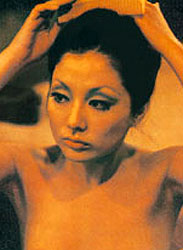 Koji Tsuruta stars as his usual sad-eyed hero in Bazoku Yakuza (The Bandits; aka, Yakuza on Horseback, Toei Kyoto, 1968), from a director most associated with Koji's Bakuchi-uchi films, & a couple of the Red Peony Gambler films.
Koji Tsuruta stars as his usual sad-eyed hero in Bazoku Yakuza (The Bandits; aka, Yakuza on Horseback, Toei Kyoto, 1968), from a director most associated with Koji's Bakuchi-uchi films, & a couple of the Red Peony Gambler films.
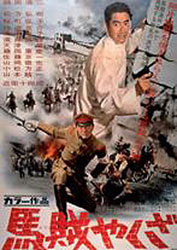 Koji's co-stars include youthful Hiroki Matsukata, & mature Jushiro Konoe. A yakuza-eiga of the "ninkyo" variety, i.e., a chivalrous gangster film, Bakuzo Yakuza is set in Formosaj. Koji's co-stars include youthful Hiroki Matsukata, & mature Jushiro Konoe. A yakuza-eiga of the "ninkyo" variety, i.e., a chivalrous gangster film, Bakuzo Yakuza is set in Formosaj.
Koji Tsuruta as gangster who serves in the cavalry. A typical action scene pits Koji's character with axe against an enemy with a Chinese sword.
Also featured are Nobuo Yana, Tatsuo Endo, Hiroko Sakuramachim, Shigeyoshi Fujioka, Toshi Amatsu, Rinichi Yamamoto, Michimaro Otabe, Hosei Komatsu, & "pinku" star Sachiko Kuwabara (aka Yukiko Kuwabara) shown at right in a stock photo.
Bazoku Yakuza is not a top notch example of the yakuza genre by any means, but tries to bring a few original moments to the table, & an unusual setting.
copyright © by Paghat the Ratgirl
|
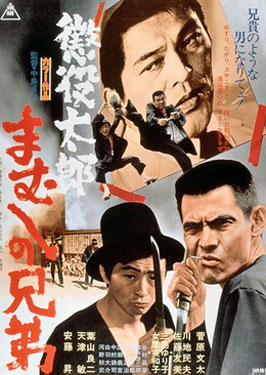

 In the pivotal role of the chivalrous yakuza gambler we get Koji Tsuruta, who is pictured here in one of my stock photos since I could not obtain a still or poster for the movie.
In the pivotal role of the chivalrous yakuza gambler we get Koji Tsuruta, who is pictured here in one of my stock photos since I could not obtain a still or poster for the movie.
 Though playfully macho for the first half, as tensions build between two gangs, the tone becomes increasingly tough. The Toyo gang are pretty much all bad guys & represent what the post-war & Occupation era yakuza have become. The Matsu gang attracts "good" tradition-minded yakuza who live by an ethical code that is vanishing from the gangster world.
Though playfully macho for the first half, as tensions build between two gangs, the tone becomes increasingly tough. The Toyo gang are pretty much all bad guys & represent what the post-war & Occupation era yakuza have become. The Matsu gang attracts "good" tradition-minded yakuza who live by an ethical code that is vanishing from the gangster world.
 Koji's co-stars include youthful Hiroki Matsukata, & mature Jushiro Konoe. A yakuza-eiga of the "ninkyo" variety, i.e., a chivalrous gangster film, Bakuzo Yakuza is set in Formosaj.
Koji's co-stars include youthful Hiroki Matsukata, & mature Jushiro Konoe. A yakuza-eiga of the "ninkyo" variety, i.e., a chivalrous gangster film, Bakuzo Yakuza is set in Formosaj.